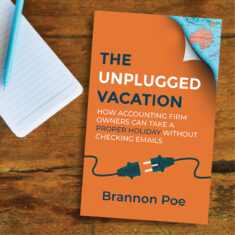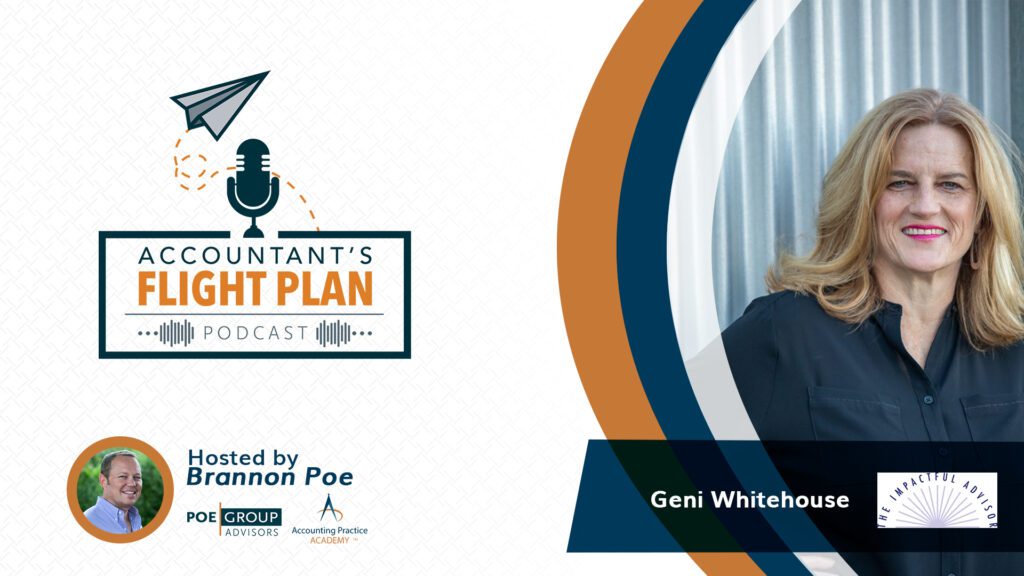
The following is an excerpt from The Unplugged Vacation
There are natural plateaus with every practice as it grows. It requires a breakthrough to get to that next level. When you go out and start a firm, you have to hustle. You have to take the work that comes your way. This is a pretty normal start-up experience. You go out, you find clients, and then you come back into the office and do the work. With accounting, fortunately and unfortunately, mistakes are costly. If you make an error on a tax return, it can have a pretty severe impact on the client. You need to be careful if you’re doing any audit or review work.
Therefore, accuracy is highly prized in accounting. It’s a detailed profession when you’re starting a practice, and you’re doing that highly detailed level of work. It tends to reward perfectionism. A lot of accountants are very detail-oriented or perfectionistic, which is great for producing high-quality work. The problem is you bump up against time constraints at some point. Then you decide you really don’t want to be the person doing and reviewing all of the work, and so you set out to scale your firm. The problem for many is that you still have this start-up mentality, “I really need work, and I need more work because I need to generate revenue.” That scarcity mindset creeps in, so you can’t say “no”, and this is a difficult trap to escape.
New work comes along, and you don’t want to say “no” to it, even if it’s not really in keeping with the type of work that you do. Accounting is a varied profession. There’s tax. There’s bookkeeping. There’s payroll. There’s review work. There are all sorts of specialties that accountants can go into, so the practice often becomes wildly unfocused. You experience heavy time constraints and lose your direction. A scattered practice is not a fun practice to own.
The “Do Anything” Mindset
Being unable to say “no” to certain work, just taking on more and more, and continuing to grow in an unfocused way, makes it nearly impossible to take any time to work on the structure of the practice. You’re just continuously putting out fires. Here’s how you know you’re in this mindset. You feel like you’re hurrying every minute of the day. You feel like you have a never-ending to-do list. You feel overwhelmed. You’re working when you’re on vacation, or maybe you haven’t taken a vacation in a while. You’re not really taking any weekends off either.
If you feel like there are no boundaries around your time, it’s probably time to put some up. It doesn’t mean you’re more successful if you have fewer boundaries. What good are a few extra dollars of top-line revenue if you don’t have any time to enjoy it?
Laptop + Cruise Ship = Unhappy Wife
Growing a business is actually a series of letting go. If you’re going to grow your business, there has to be a natural release of things. That really feels strange when you’re trying to acquire new work and new business and going from “give me more and more and more” to “less and less and less” because you’re delegating work as you grow…(or you eventually reach a point where don’t grow at all, and you have no personal time left.) As you scale your firm profitably, you’re letting go of responsibilities that you used to have. Virtually everyone who has successfully scaled any business knows this experience. I started brokering CPA firms in 2003. I was very much in that start-up phase. At the time, I was working long hours, and I really didn’t mind it. I enjoyed the work tremendously. For me to work from 7:00 in the morning until 10:00 at night really wasn’t a problem. I had no negativity towards those hours in the beginning.
Actually, my wife and I had several conversations before I started the business. We agreed that all my time was probably going to be required in that start-up phase for a year or so, and then it would need to taper off. The business grew swiftly, and we decided to take a nice family vacation. This was 2005, I believe, about two years after I had started up. Our children were fairly small. We took a cruise. We’d never been on a cruise before, so we figured we would try it out.
I took my laptop on this vacation. I would tell my wife, “I need to go check-in. I need to check my email.” You didn’t have WiFi all over the ship back then, so I went to the internet café, and I would check my email. Of course, I would tell my wife, “I’m only going to be 30 minutes or an hour.” Then I’d come back three hours later. She would be upset because she was taking care of our three children the entire time I was gone. This went on about every day of the trip.
The cruise ended, and we came back to the port. We were literally walking off the ship, and she looked me right in the eye and said, “If you ever take a laptop on another vacation again, I’m
throwing it in the water.” I knew she meant it. That was me pre-“unplugged” when on vacation.
What It’s Like Now
Fast forward to now, and I don’t even take my own cell phone on vacation. I swapped my laptop for a good book. We just go. Sometimes we’ll go for three weeks at a time. Next year, I’m thinking seriously about taking a longer, six-week break. I just put an email responder on and do the preparation tasks that we’ve mapped out. I go, and I enjoy my time off. I sleep like a king, and I completely unwind.
It takes a couple of days to stop thinking about things at work. Your brain has this momentum. It takes a little while to get into vacation mode, but once you get into that mode, I’ve found gears that I didn’t know I had. I’m a pretty hard-charging, hard-working person, but I have discovered that I have an unexpectedly slow, easy-going capability as well.
The first step is admitting that you can take a vacation. Your business will be there when you get back. If you’re not working all the time, it’s okay. Your business is not going to crumble behind you.
This is the first chapter in The Unplugged Vacation. If you want to read the whole book, download it for free at PoeGroupAdvisors.com/unplug







